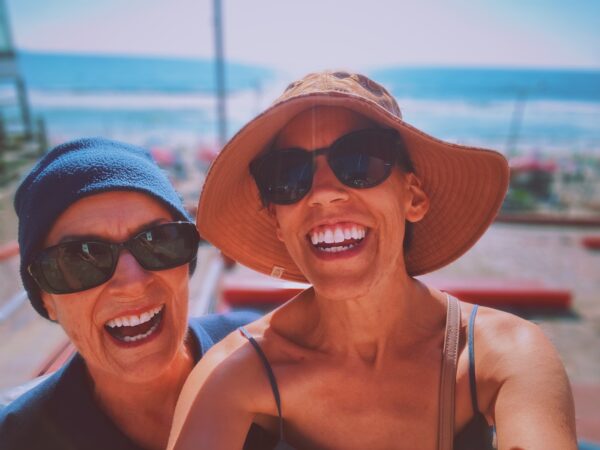by Marla Moffet
I wanted to write something profound about how I have developed unconditional freedom in this six-month journey with my mom, Karla, since her January breast cancer diagnosis, but the truth is — I am not free at all. I am utterly attached to this human who birthed me and who pours love on me over and over again — no matter how much of a mess I make.
So in lieu of offering a triumphant how to be the perfect caregiving daughter, I thought I would offer a list of what not to do…
Don’t:
1. Dote. Basically, every one of us has cancer cells, but the condition only becomes an issue if the immune system cannot regulate them. When I found out my mom had cancer, I moved home and did tons of things for her that she could do for herself — because I liked the feeling of being needed and being close. The intimacy and beauty is there without overdoing it and then collapsing from exhaustion. Now I’m learning which things to help with and which things to let her do on her own. Last week she tracked down the hotel staff here in Mexico and did laundry for both of us. She came back feeling happy to contribute.
2. Forget yourself. This is a big one for me. Why would I need to eat if she had a list of 50 supplements that needs organizing and managing — well, quite simply because a hangry caregiver is not so caring. Set up a network of friends who you can pray with, laugh with, and mostly who can hold you accountable to getting that massage, eating something on/off your diet depending on your tendencies, lol, and mostly remind you that you are doing a good job just by being there.
3. Micromanage. In my mom’s case, she’s gone from standard chemo to no more chemo and only integrative and alternative cancer treatments. There’s a literal spreadsheet I made to organize her above mentioned supplements. What I understand now that I didn’t in the beginning is that the spreadsheet helped her get a sense of what was what and how much to take when, so she could devise her own supplement-taking system. This same “don’t” also applies to her exercise routine, juicing, diet, essential oil application, etc. Learning someone’s protocols is an act of love — enforcing them or even asking too many questions about them, much less helpful. (I’m still working on this one.)
4. Obsess. For example, my mom is aiming to keep her pH at neutral (7-7.5). This is something that fluctuates naturally and tends to be in the acidic range for cancer patients. Karla’s UK doc texted me the “No obsession” reminder (with !!!) once I reported her pH had fallen to 5.5 after we had valiantly made it to neutral. Obsession isn’t all bad though. I recently — after many failed attempts — made her the best vegan broth she’s ever had. Find a fun channel for the obsessive part that will delight your loved one.
5. Yell. This might be a no-brainer for everyone but me, but when stress is high and a lot is happening, it’s good to check in with yourself before losing it at your loved one. Instead, maybe phone a friend, go for a walk, do some sun salutations, journal, or chant a favorite mantra. All of these alternatives help me come back to myself and remember the most likely reason I am exploding in the first place is because I don’t want to lose her, and I have exaggerated my own importance/role/function in this equation. When I remember I am powerless over her cancer, I can remember to simply be present and kind.

 Get access to the monthly Rehumanization Magazine featuring contributors from the front lines of this effort—those living on Death Row, residents of the largest women’s prison in the world, renowned ecologists, the food insecure, and veteran correctional officers alike.
Get access to the monthly Rehumanization Magazine featuring contributors from the front lines of this effort—those living on Death Row, residents of the largest women’s prison in the world, renowned ecologists, the food insecure, and veteran correctional officers alike.